How to remove applications causing redirects to load28.biz
Notification SpamAlso Known As: load28.biz pop-up
Get free scan and check if your device is infected.
Remove it nowTo use full-featured product, you have to purchase a license for Combo Cleaner. Seven days free trial available. Combo Cleaner is owned and operated by RCS LT, the parent company of PCRisk.com.
What is the load28[.]biz site?
load28[.]biz is a rogue website, which shares many similarities with goodmode.biz, pointcaptchaspot.com, zvideo-live.com, and thousands of others. This page operates by presenting visitors with dubious content and/or redirecting them to other bogus/malicious sites.
Visitors seldom access load28[.]biz or similar sites intentionally, they are usually redirected to them by intrusive advertisements or Potentially Unwanted Applications (PUAs) already installed on their devices. These apps do not require explicit user consent to infiltrate systems. PUAs cause redirects, deliver intrusive ad campaigns, and collect browsing-related data.
![load28[.]biz pop-up redirects](/images/stories/screenshots202102/load28-biz-website-ads-main.jpg)
When entered, load28[.]biz first checks visitors' IP (Internet Protocol) addresses to learn their geolocations. This information determines the site's behavior. I.e., whether visitors are redirected elsewhere and/or are presented with dubious material depends on their geolocations.
Additionally, rogue websites use deceptive techniques (e.g., 'clickbait') to trick users into enabling their browser notifications - load28[.]biz is no exception to this and the consent option to its notifications is disguised as a CAPTCHA verification - "Click Allow if you are not a robot". If the notifications are enabled, the page starts running intrusive advertisement campaigns.
The delivered ads are more than just a nuisance, they are also dangerous. When clicked, intrusive ads can redirect to untrusted, rogue, compromised, deceptive/scam, and malicious sites. Some of these advertisements can download/install software (e.g., PUAs) without users' permission when they are clicked.
Potentially unwanted applications can have undisclosed and dangerous functionality, which may be in varied combinations. For example, PUAs can force-open harmful websites and run intrusive ad campaigns. Furthermore, most apps of this type have data tracking capabilities. They can monitor browsing activity (visited URLs, viewed pages, searched queries, etc.) and collect sensitive information extracted from it (IP addresses, geolocations, and other details). Furthermore, the gathered data can contain personally identifiable information. PUA developers monetize this data by sharing it with and/or selling it to third parties (potentially, cyber criminals).
In summary, the presence of unwanted software on devices can result in system infections, serious privacy issues, financial loss, and even identity theft. Therefore, it is crucial to remove all suspicious applications and browser extensions/plug-ins without delay.
| Name | load28.biz pop-up |
| Threat Type | Push notifications ads, Unwanted ads, Pop-up ads |
| Detection Names | Fortinet (Spam), Spamhaus (Spam), Full List Of Detections (VirusTotal) |
| Serving IP Address | 134.209.136.68 |
| Observed Domains | 0.load28[.]biz; 1.load28[.]biz; 2.load28[.]biz; 4.load28[.]biz; 5.load28[.]biz; 8.load28[.]biz; 7.load28[.]biz |
| Symptoms | Seeing advertisements not originating from the sites you are browsing. Intrusive pop-up ads. Decreased Internet browsing speed. |
| Distribution Methods | Deceptive pop-up ads, potentially unwanted applications (adware) |
| Damage | Decreased computer performance, browser tracking - privacy issues, possible additional malware infections. |
| Malware Removal (Windows) |
To eliminate possible malware infections, scan your computer with legitimate antivirus software. Our security researchers recommend using Combo Cleaner. Download Combo CleanerTo use full-featured product, you have to purchase a license for Combo Cleaner. 7 days free trial available. Combo Cleaner is owned and operated by RCS LT, the parent company of PCRisk.com. |
PUAs may seem legitimate and harmless, and entice users into download/installation with offers of various "useful" functionality, however, the advertised features are usually nonoperational. The sole purpose of this unwanted software is to generate profit for the developers. Rather than delivering any real value, PUAs cause redirects, run intrusive advertisement campaigns, and collect private information.
How did adware install on my computer?
PUAs are distributed via download/installation set-ups of other products. This deceptive marketing tactic of packing regular software with unwanted or malicious additions is called "bundling".
Rushing download/installation processes (e.g. ignoring terms, skipping steps and settings, etc.) increases the risk of inadvertently allowing bundled content into the system.
Some PUAs have "official" download sites. Intrusive advertisements proliferate these applications as well. Once clicked, they can execute scripts to download/install PUAs without users' consent.
How to avoid installation of potentially unwanted applications
You are advised to research all software before download/installation. Use only official and verified download channels. Unofficial and free file-hosting websites, Peer-to-Peer sharing networks (BitTorrent, Gnutella, eMule), and other third party downloaders commonly offer harmful and bundled content, and are therefore untrusted and should be avoided.
When downloading/installing, read the terms, study all possible options, use the "Custom/Advanced" settings and opt-out of additional apps, tools, features, and so on.
Intrusive advertisements typically seem legitimate, however, they can redirect to dubious and malicious sites (e.g. gambling, pornography, adult-dating, and many others). If you encounter ads or redirects of this kind, inspect the system and remove all dubious applications and browser extensions/plug-ins immediately.
Installed programs must be activated and updated with tools or implemented functions that are provided by the official developers. No other third party, unofficial tools should be used.
Note that it is illegal to activate licensed software with ‘cracking’ tools. Files and programs should be downloaded from official websites and via direct download links. Avoid third party installers and the tools/sources mentioned above.
Do not open website links or files in irrelevant emails that are received from unknown, suspicious addresses. These bogus emails are often disguised as official and important. Regularly, scan your computer with reputable, up-to-date antivirus or anti-spyware software.
If your computer is already infected with rogue applications, we recommend running a scan with Combo Cleaner Antivirus for Windows to automatically eliminate them.
Appearance of load28[.]biz website (GIF):
![load28[.]biz website appearance (GIF)](/images/stories/screenshots202102/load28-biz-website-ads-appearance.gif)
Instant automatic malware removal:
Manual threat removal might be a lengthy and complicated process that requires advanced IT skills. Combo Cleaner is a professional automatic malware removal tool that is recommended to get rid of malware. Download it by clicking the button below:
DOWNLOAD Combo CleanerBy downloading any software listed on this website you agree to our Privacy Policy and Terms of Use. To use full-featured product, you have to purchase a license for Combo Cleaner. 7 days free trial available. Combo Cleaner is owned and operated by RCS LT, the parent company of PCRisk.com.
Quick menu:
- What is load28.biz pop-up?
- STEP 1. Remove spam notifications from Google Chrome
- STEP 2. Remove spam notifications from Google Chrome (Android)
- STEP 3. Remove spam notifications from Mozilla Firefox
- STEP 4. Remove spam notifications from Microsoft Edge
- STEP 5. Remove spam notifications from Safari (macOS)
Disable unwanted browser notifications:
Video showing how to disable web browser notifications:
 Remove spam notifications from Google Chrome:
Remove spam notifications from Google Chrome:
Click the Menu button (three dots) on the right upper corner of the screen and select "Settings". In the opened window select "Privacy and security", then click on "Site Settings" and choose "Notifications".
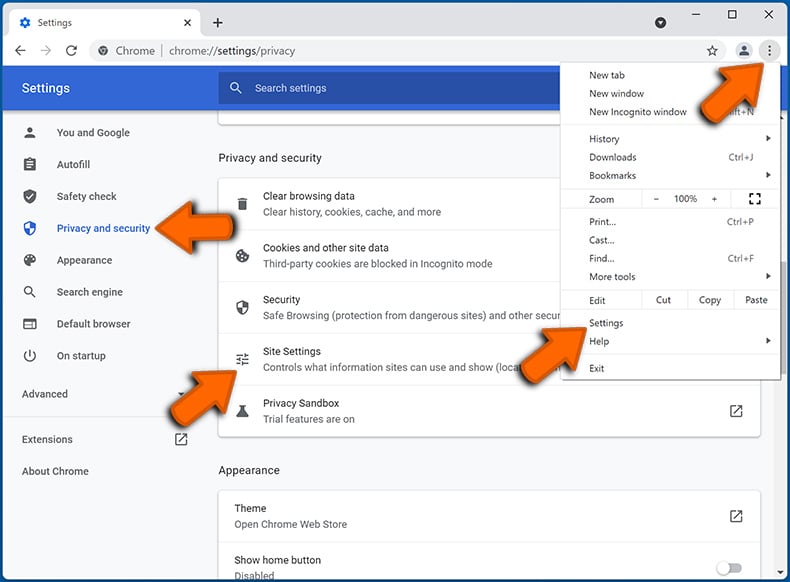
In the "Allowed to send notifications" list search for websites that you want to stop receiving notifications from. Click on the three dots icon near the website URL and click "Block" or "Remove" (if you click "Remove" and visit the malicious site once more, it will ask to enable notifications again).
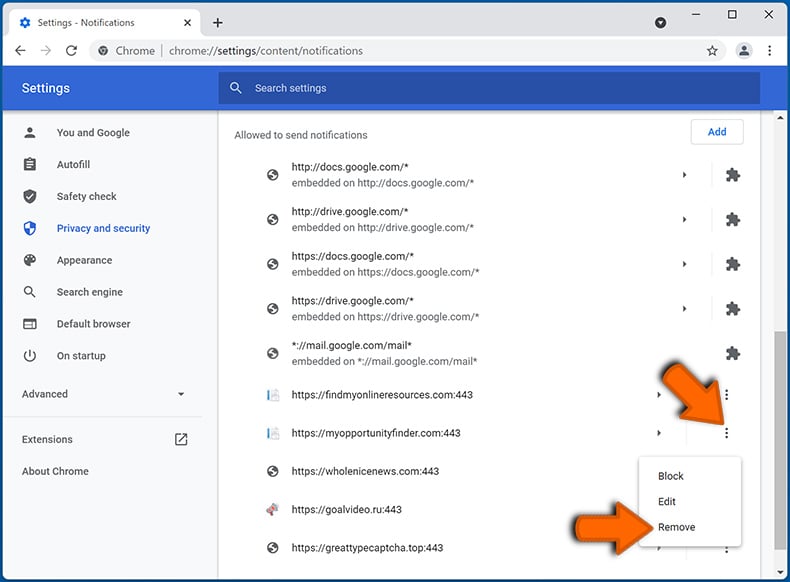
 Remove spam notifications from Google Chrome (Android):
Remove spam notifications from Google Chrome (Android):
Tap the Menu button (three dots) on the right upper corner of the screen and select "Settings". Scroll down, tap on "Site settings" and then "Notifications".
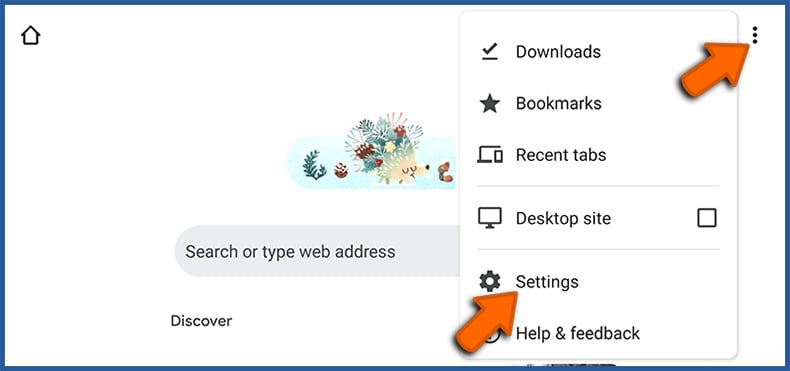
In the opened window, locate all suspicious URLs and tap on them one-by-one. Once the pop-up shows up, select either "Block" or "Remove" (if you tap "Remove" and visit the malicious site once more, it will ask to enable notifications again).
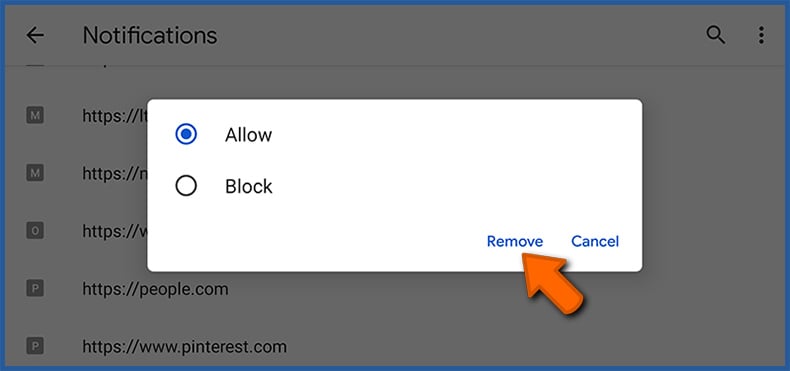
 Remove spam notifications from Mozilla Firefox:
Remove spam notifications from Mozilla Firefox:
Click the Menu button (three bars) on the right upper corner of the screen. Select "Settings" and click on "Privacy & Security" in the toolbar on the left hand side of the screen. Scroll down to the "Permissions" section and click the "Settings" button next to "Notifications".
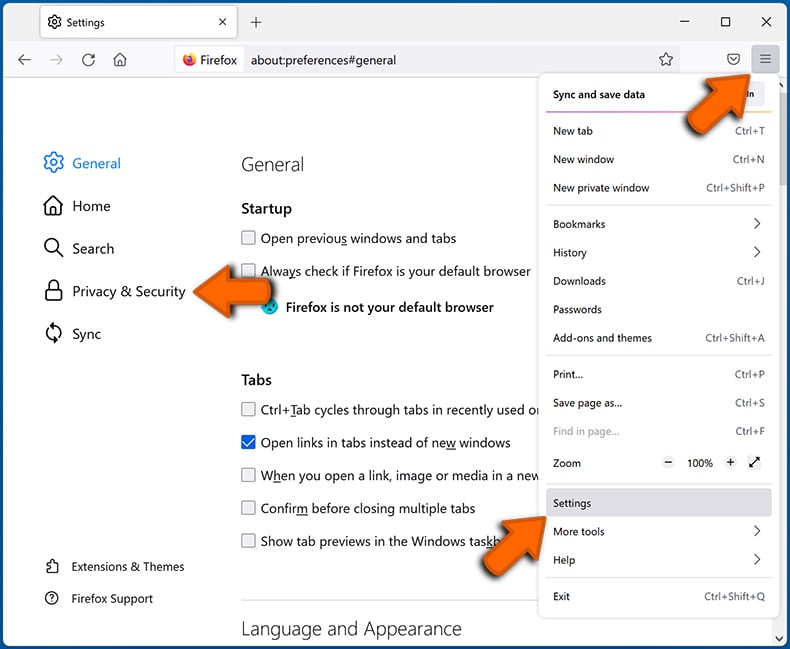
In the opened window, locate all suspicious URLs and block them using the drop-down menu or either remove them by clicking "Remove Website" at the bottom of the window (if you click "Remove Website" and visit the malicious site once more, it will ask to enable notifications again).
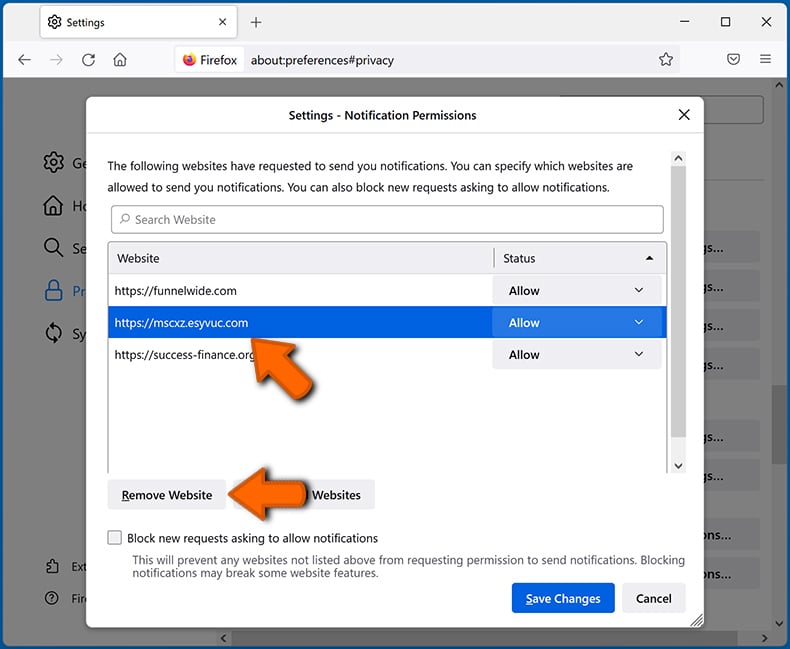
 Remove spam notifications from Microsoft Edge:
Remove spam notifications from Microsoft Edge:
Click the menu button (three dots) on the right upper corner of the Edge window and select "Settings". Click on "Cookies and site permissions" in the toolbar on the left hand side of the screen and select "Notifications".
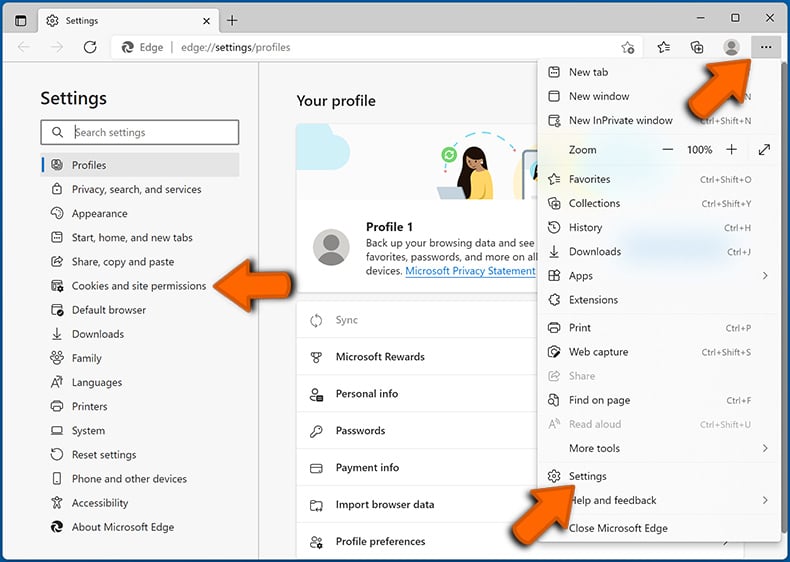
Click three dots on the right hand side of each suspicious URL under "Allow" section and click "Block" or "Remove" (if you click "Remove" and visit the malicious site once more, it will ask to enable notifications again).
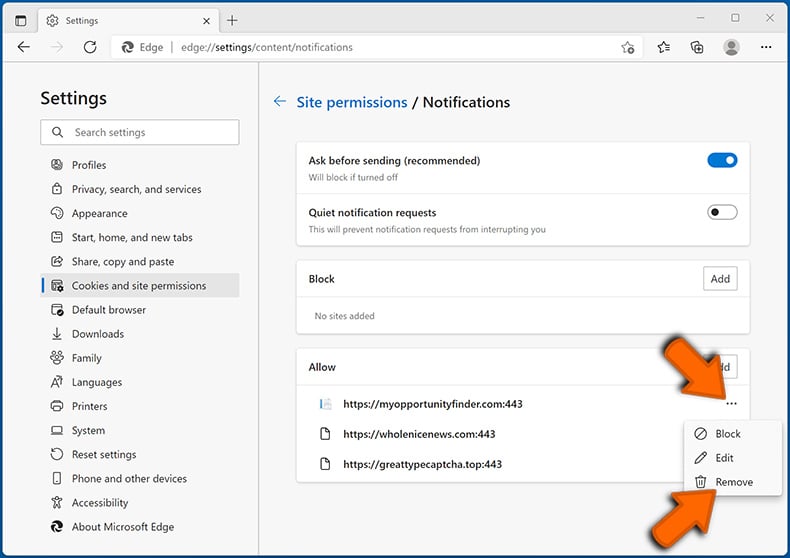
 Remove spam notifications from Safari (macOS):
Remove spam notifications from Safari (macOS):
Click "Safari" button on the left upper corner of the screen and select "Preferences...". Select the "Websites" tab and then select "Notifications" section on the left pane.
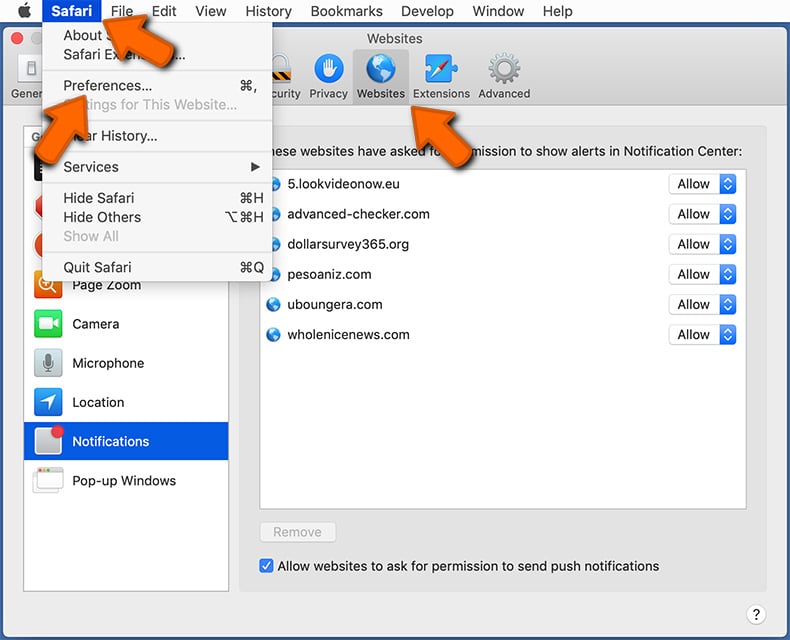
Check for suspicious URLs and apply the "Deny" option using the drop-down menu or either remove them by clicking "Remove" at the bottom of the window (if you click "Remove" and visit the malicious site once more, it will ask to enable notifications again)
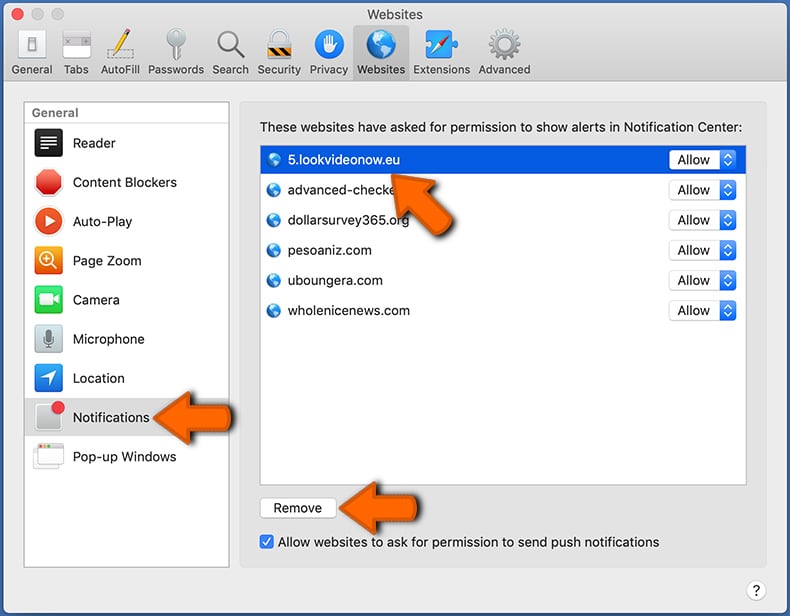
How to avoid browser notification spam?
Internet users should be very skeptical when being asked to allow notifications. While this is a useful feature that allows you to receive timely news from websites you like, deceptive marketers frequently abuse it.
Only allow notifications from websites that you fully trust. For added security - use an anti-malware application with a real-time web browsing monitor to block shady websites that tries to trick you into allowing spam notifications. We recommend using Combo Cleaner Antivirus for Windows.
Share:

Tomas Meskauskas
Expert security researcher, professional malware analyst
I am passionate about computer security and technology. I have an experience of over 10 years working in various companies related to computer technical issue solving and Internet security. I have been working as an author and editor for pcrisk.com since 2010. Follow me on Twitter and LinkedIn to stay informed about the latest online security threats.
PCrisk security portal is brought by a company RCS LT.
Joined forces of security researchers help educate computer users about the latest online security threats. More information about the company RCS LT.
Our malware removal guides are free. However, if you want to support us you can send us a donation.
DonatePCrisk security portal is brought by a company RCS LT.
Joined forces of security researchers help educate computer users about the latest online security threats. More information about the company RCS LT.
Our malware removal guides are free. However, if you want to support us you can send us a donation.
Donate
▼ Show Discussion